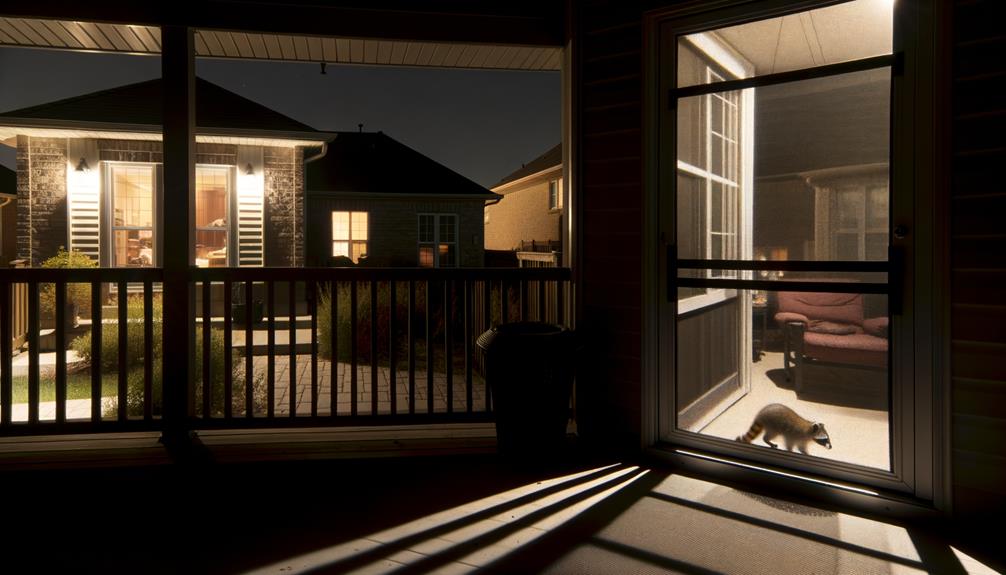Upgrading Screen Doors to Effectively Keep Raccoons Out
Screen doors can successfully keep raccoons out if they are made from high-strength materials such as stainless steel mesh or heavy-duty aluminum. These materials offer superior resistance to penetration and corrosion.
Employing strong locking mechanisms, like multi-point locks or keyed locks, enhances security. Additionally, reinforcing the frame and adding protective grilles can prevent raccoons from exploiting vulnerabilities.
Regular inspections and maintenance are crucial to guarantee all entry points stay secure. Using a combination of these methods provides a strong barrier against raccoon intrusions.
Understanding these practical solutions can greatly enhance home security against wildlife threats.

Key Takeaways
- High-strength stainless steel mesh and heavy-duty aluminum frames make screen doors resistant to raccoon entry.
- Robust locking mechanisms, such as keyed locks or multi-point systems, enhance screen door security against raccoons.
- Regular maintenance and prompt repair of screen doors prevent raccoons from exploiting vulnerabilities.
- Adding protective grilles or metal reinforcements over the screen increases resistance to raccoon damage.
- Combining screen doors with additional deterrents like motion-activated lights or natural repellents maximizes protection against raccoon intrusion.
Understanding Raccoon Behavior
Understanding raccoon behavior is vital for implementing effective measures to keep these intelligent and persistent animals out of your home. Raccoons are nocturnal creatures known for their dexterity and problem-solving skills. They are attracted to food sources and shelter, making homes an appealing target.
To deter raccoons, it's crucial to secure trash bins, eliminate food remnants, and seal entry points. Their curiosity and adaptability mean they can exploit even minor vulnerabilities. Employing robust materials for barriers and maintaining vigilance can greatly reduce the likelihood of intrusion.
Additionally, understanding their seasonal patterns and breeding habits can inform proactive measures, ensuring raccoons do not establish residence. Prioritizing safety and humane practices aligns with the goal of serving and protecting community welfare.
How Raccoons Enter Homes
Identifying common entry points such as gaps in roofing, unsecured vents, and weak spots in siding is vital for preventing raccoons from accessing your home. Raccoons are adept climbers and can exploit even the smallest vulnerabilities in your home's exterior. Ensuring that these areas are fortified can minimize the risk.
| Common Entry Point | Description | Recommended Action |
|---|---|---|
| Roofing Gaps | Small openings in roof structure | Seal with durable materials |
| Unsecured Vents | Vents lacking proper covers | Install secure vent covers |
| Weak Siding | Damaged or old siding panels | Repair or replace siding |
| Chimney Access | Uncapped chimneys | Install chimney caps |
| Window Cracks | Cracks or gaps around windows | Apply weather stripping or caulk |
Regular inspections and maintenance are essential to maintaining a secure environment and safeguarding your home against raccoon intrusion.
Types of Screen Doors
When selecting screen doors to keep raccoons out, it is important to take into account the material and durability, as well as the locking mechanisms and installation process.
High-quality materials like steel or heavy-duty aluminum offer superior resistance to raccoon tampering. Additionally, strong locking mechanisms and professional installation guarantee the screen door remains secure and effective in preventing entry.
Material and Durability
Selecting the right material for a screen door is essential for ensuring both its durability and effectiveness in keeping raccoons out. Materials like stainless steel mesh and heavy-duty aluminum are highly recommended due to their resilience against tearing and gnawing.
Stainless steel offers superior strength and corrosion resistance, making it an ideal choice for long-term use. Heavy-duty aluminum, while slightly less robust, provides a lightweight yet sturdy alternative. Additionally, consider powder-coated finishes for enhanced durability and rust prevention.
Investing in these high-quality materials not only fortifies the screen door against raccoon intrusions but also guarantees the safety and security of the household. Prioritizing robust materials ultimately leads to practical, long-lasting solutions that serve and protect your living environment.
Locking Mechanisms
Implementing strong locking mechanisms is crucial for enhancing the security of screen doors and preventing raccoon intrusions.
Various types of locks can be integrated into screen doors to achieve this goal. Keyed locks provide robust security, guaranteeing that the door cannot be easily pried open.
Push-button locks offer convenience and are effective against raccoons that may attempt to manipulate simpler mechanisms.
Additionally, multi-point locking systems distribute the locking force across multiple points, making it significantly more challenging for raccoons to breach the door.
Magnetic locks, while less common, can also be effective when used in conjunction with other locking mechanisms.
Selecting the appropriate locking system, tailored to your specific needs, ensures a safer and more secure living environment.
Installation Process
Understanding the installation process for various types of screen doors is essential for ensuring best security and functionality. Proper installation not only improves door longevity but also enhances protection against raccoons.
Here are key types of screen doors and their respective installation considerations:
- Hinged Screen Doors: Easy to install but require precise alignment to prevent gaps that raccoons can exploit.
- Sliding Screen Doors: Demand accurate track alignment and smooth operation to avoid vulnerabilities.
- Retractable Screen Doors: Involve a more complex installation, necessitating careful attention to the retracting mechanism.
- Security Screen Doors: Offer enhanced protection; installation must focus on securing the frame firmly to prevent forced entry.
Screen Door Materials
When selecting screen door materials to keep raccoons out, it is important to factor in the strength and durability of the components.
High-quality mesh types, such as stainless steel or heavy-duty fiberglass, provide robust barriers against persistent wildlife.
Additionally, frames made from aluminum or reinforced steel offer enhanced stability and resistance to damage.
Strength and Durability
Selecting strong and durable materials for screen doors is essential in ensuring they effectively withstand raccoon intrusion and other environmental challenges. For homeowners looking to protect their property and loved ones, choosing high-quality materials can make all the difference. Robust screen doors offer not only security but also peace of mind.
Key materials to contemplate include:
- Stainless Steel: Known for its strength and resistance to corrosion.
- Heavy-Duty Aluminum: Lightweight yet sturdy, providing a solid barrier.
- Fiberglass: Offers durability with flexibility, ideal for heavy use.
- Reinforced Vinyl: Combines strength with weather resistance, ensuring longevity.
Each of these materials presents unique advantages, thereby enhancing the safety and durability of screen doors against raccoons and other potential threats.
Mesh Types Available
Different mesh varieties for screen doors offer varying levels of protection, durability, and visibility to meet diverse homeowner needs. Standard fiberglass mesh is cost-effective and provides good visibility but lacks the resilience necessary to deter raccoons.
Aluminum mesh, although stronger, can corrode over time. For top-notch protection, stainless steel mesh is recommended; it is sturdy enough to withstand raccoon attempts at entry and offers superior longevity.
Pet-resistant mesh, typically crafted from heavy-duty polyester or vinyl-coated polyester, is another suitable option, known for its resilience and tear resistance. Choosing the appropriate mesh type not only enhances security but also ensures the screen door remains functional and aesthetically pleasing, thereby promoting safety and peace of mind for homeowners.
Frame Material Options
A sturdy frame material is vital for ensuring the durability and effectiveness of a screen door in keeping raccoons at bay. When selecting a frame material, it is important to explore options that offer both strength and longevity.
The following materials are highly recommended for their resilience and protective qualities:
- Aluminum: Lightweight yet strong, resistant to corrosion.
- Steel: Offers maximum durability, can withstand substantial force.
- Wood: Provides a classic look, suitable when treated for outdoor use.
- Vinyl: Low maintenance and resistant to weather conditions.
Each material presents unique advantages, but ensuring the frame's integrity is crucial in safeguarding against raccoon intrusion.
Prioritizing these sturdy materials will contribute significantly to the safety and effectiveness of your screen door solution.
Strengthening Screen Doors
To effectively fortify screen doors against raccoon intrusions, employing sturdy materials and advanced locking mechanisms is essential. Utilizing high-strength stainless steel mesh can greatly enhance the door's resistance to claws and bites. This material is not only durable but also offers excellent visibility and ventilation.
Additionally, reinforcing the door frame with aluminum or steel can prevent raccoons from prying open weak points. Also, consider adding a protective grille over the screen, which serves as a secondary barrier. Ensuring that the screen door fits securely within its frame is vital to eliminate gaps that raccoons might exploit.
Installing Locking Mechanisms
Implementing robust locking mechanisms is crucial for maintaining screen doors secure against raccoon intrusions. Proper locks not only enhance the security of your home but also contribute to the safety of the household by preventing unwanted wildlife access.
Consider the following options for effective screen door locking solutions:
- Heavy-Duty Latches: Reinforced latches that resist tampering and provide a strong hold.
- Automatic Locks: Devices that automatically secure the door when closed, reducing forgetfulness.
- Keyed Locks: Traditional keyed mechanisms offering high security, ideal for areas with frequent raccoon activity.
- Childproof Locks: Dual-purpose locks that guarantee both child safety and raccoon deterrence, adding an extra layer of protection.
These solutions are practical and help maintain a raccoon-free environment, ensuring peace of mind.
Additional Barriers
In addition to robust locking mechanisms, installing physical barriers can greatly enhance the effectiveness of screen doors in deterring raccoon intrusions. Consider adding metal grilles or mesh reinforcements to your screen doors. These barriers provide an additional layer of protection, making it significantly more challenging for raccoons to tear through the material.
Additionally, weather stripping along the edges of the door can eliminate gaps that raccoons might exploit. For areas with high raccoon activity, motion-activated lights or sprinklers can serve as effective deterrents by startling and repelling these nocturnal creatures.
Prioritizing these practical solutions can not only safeguard your home but also enhance the safety and well-being of the community you serve.
Maintenance Tips
Regular upkeep of your screen doors is vital to guarantee their durability and effectiveness in deterring raccoons. To make sure your screen doors maintain a reliable barrier, consider the following expert tips:
- Inspect Regularly: Conduct periodic checks for any wear and tear, such as holes or loose frames, and address these issues promptly.
- Tighten Screws and Hinges: Confirm all screws and hinges are securely fastened to prevent gaps that raccoons could exploit.
- Clean Thoroughly: Regularly clean the screen and frame to remove debris and prevent material degradation.
- Lubricate Moving Parts: Apply appropriate lubricants to hinges and locks to maintain smooth operation and avoid unnecessary strain.
Implementing these practical solutions will enhance safety and maintain the screen door's continued effectiveness.
Alternative Deterrents
Beyond maintaining your screen doors, it's also wise to explore alternative deterrents for a thorough approach in keeping raccoons at bay. Various methods can be employed to enhance your home's defense system, ensuring safety for your household and community. Natural repellents, motion-activated devices, and secure trash management are effective strategies to take into account.
| Deterrent Type | Description | Effectiveness |
|---|---|---|
| Natural Repellents | Utilize scents like ammonia or predator urine | Moderate |
| Motion-Activated | Devices that emit lights or sounds | High |
| Secure Trash Cans | Heavy-duty, lockable trash containers | Very High |
Employing a combination of these methods can deter raccoons effectively. Each solution is designed to address specific vulnerabilities, offering a multi-layered approach to safeguarding your property.
Conclusion
The efficacy of screen doors in deterring raccoons hinges on understanding their behavior and implementing robust materials and locking mechanisms.
Just as a fortress's strength is determined by its weakest point, a screen door fortified with durable materials and secure locks can serve as a formidable barrier against raccoon intrusions.
Regular maintenance and additional deterrents further enhance security, ensuring that homes remain safe from these clever and persistent creatures.






